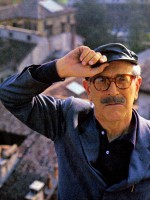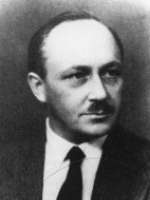Walter Ruttmann is a Director, Scriptwriter, Director of Photography, Editor and Art Direction Allemand born on 28 december 1887 at Frankfurt (German)

Walter Ruttmann (28 December 1887 – 15 July 1941) was a German film director and along with Hans Richter, Viking Eggeling and Oskar Fischinger was an early German practitioner of experimental film.
Ruttmann was born in Frankfurt am Main; he studied architecture and painting and worked as a graphic designer. His film career began in the early 1920s. His first abstract short films, "Lichtspiel: Opus I" (1921) and "Opus II" (1923), were experiments with new forms of film expression, and the influence of these early abstract films can be seen in some of the early work of Oskar Fischinger. Ruttmann and his colleagues of the avant garde movement enriched the language of film as a medium with new form techniques.
Ruttmann was a prominent exponent of both avant-garde art and music. His early abstractions played at the 1929 Baden-Baden Festival to international acclaim despite their being almost eight years old. Ruttmann licensed a Wax Slicing machine from Oskar Fischinger to create special effects for Lotte Reiniger. Together with Erwin Piscator, he worked on the experimental film Melodie der Welt (1929), though he is best remembered for Berlin: Die Sinfonie der Großstadt (Berlin: Symphony of a Great City, 1927).
During the Nazi period he worked as an assistant to director Leni Riefenstahl on Triumph of the Will (1935). He died in Berlin.
Pendant la Première Guerre mondiale, il est lieutenant d'artillerie sur le front de l'est, puis, malade, passe l'année 1917 au sanatorium.
Avec Opus I, réalisé en 1921, Walter Ruttmann est le pionnier du cinéma abstrait appelé en Allemagne le Absoluter Film. La première projection publique a lieu le 27 avril 1921 à la Marmorhaus de Berlin. La partition musicale originale est de Max Butting. Il rencontrera à cette projection Oskar Fischinger à qui il achètera, l'année suivante, sa machine à tronçonner la cire avec laquelle Fischinger réalisa ses premières œuvres. Les Opus II, III et IV, sont présentées le 25 juin 1925 à la Marmorhaus de Berlin, en même temps que la Symphonie diagonale de Viking Eggeling.
À partir de 1925 il travaille avec Lore Leudesdorff, une étudiante du Bauhaus, qui l'assiste pour son Opus V et des films publicitaires que Ruttmann réalise à ce moment. En 1925-26 il rencontre Karl Freund et le scénariste Carl Mayer avec qui il a l'idée d'un film sur Berlin, ce sera Berlin, symphonie d'une grande ville (Berlin: Die Sinfonie der Großstadt, 1927), qui le rend célèbre dans le monde entier.
Considéré alors comme un pacifiste de gauche, il fera un voyage à Moscou en 1928 et 1929. Il adhère à l'idéologie nazie dans les années 1930. Il est l'assistant de Leni Riefenstahl pour Les Dieux du stade, puis réalise ensuite des films de propagande pour l'armée nazie peu avant de mourir des suites de l'amputation d'une jambe.
Source : Wikidata
Walter Ruttmann

- Infos
- Photos
- Best films
- Family
- Characters
- Awards
Nationality German
Birth 28 december 1887 at Frankfurt (German)
Death 15 july 1941 (at 53 years) at Berlin (German)
Birth 28 december 1887 at Frankfurt (German)
Death 15 july 1941 (at 53 years) at Berlin (German)
Ruttmann was born in Frankfurt am Main; he studied architecture and painting and worked as a graphic designer. His film career began in the early 1920s. His first abstract short films, "Lichtspiel: Opus I" (1921) and "Opus II" (1923), were experiments with new forms of film expression, and the influence of these early abstract films can be seen in some of the early work of Oskar Fischinger. Ruttmann and his colleagues of the avant garde movement enriched the language of film as a medium with new form techniques.
Ruttmann was a prominent exponent of both avant-garde art and music. His early abstractions played at the 1929 Baden-Baden Festival to international acclaim despite their being almost eight years old. Ruttmann licensed a Wax Slicing machine from Oskar Fischinger to create special effects for Lotte Reiniger. Together with Erwin Piscator, he worked on the experimental film Melodie der Welt (1929), though he is best remembered for Berlin: Die Sinfonie der Großstadt (Berlin: Symphony of a Great City, 1927).
During the Nazi period he worked as an assistant to director Leni Riefenstahl on Triumph of the Will (1935). He died in Berlin.
Biography
Après son baccalauréat passé en 1905, Walter Ruttmann commence des études d'architecture à Zürich puis de peinture à Munich où il se lie d'amitié avec Paul Klee et Lyonel Feininger. En 1917 il peint ses premières compositions abstraites puis déclare, l'année suivante, abandonner les tableaux pour la « peinture avec le temps (Malerei mit Zeit) ». Il construit alors un dispositif qui sera à la base de son Opus I.Pendant la Première Guerre mondiale, il est lieutenant d'artillerie sur le front de l'est, puis, malade, passe l'année 1917 au sanatorium.
Avec Opus I, réalisé en 1921, Walter Ruttmann est le pionnier du cinéma abstrait appelé en Allemagne le Absoluter Film. La première projection publique a lieu le 27 avril 1921 à la Marmorhaus de Berlin. La partition musicale originale est de Max Butting. Il rencontrera à cette projection Oskar Fischinger à qui il achètera, l'année suivante, sa machine à tronçonner la cire avec laquelle Fischinger réalisa ses premières œuvres. Les Opus II, III et IV, sont présentées le 25 juin 1925 à la Marmorhaus de Berlin, en même temps que la Symphonie diagonale de Viking Eggeling.
À partir de 1925 il travaille avec Lore Leudesdorff, une étudiante du Bauhaus, qui l'assiste pour son Opus V et des films publicitaires que Ruttmann réalise à ce moment. En 1925-26 il rencontre Karl Freund et le scénariste Carl Mayer avec qui il a l'idée d'un film sur Berlin, ce sera Berlin, symphonie d'une grande ville (Berlin: Die Sinfonie der Großstadt, 1927), qui le rend célèbre dans le monde entier.
Considéré alors comme un pacifiste de gauche, il fera un voyage à Moscou en 1928 et 1929. Il adhère à l'idéologie nazie dans les années 1930. Il est l'assistant de Leni Riefenstahl pour Les Dieux du stade, puis réalise ensuite des films de propagande pour l'armée nazie peu avant de mourir des suites de l'amputation d'une jambe.
Usually with
Filmography of Walter Ruttmann (9 films)
Director
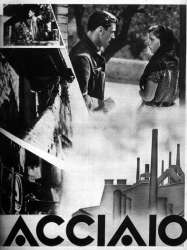
Steel (1933)
, 1h7Directed by Walter Ruttmann, Mario Soldati
Origin Italie
Genres Drama
Themes Politique, Films about the labor movement, Political films
Actors Piero Pastore, Isa Pola, Olga Capri, Romano Calò, Romolo Costa, Domenico Serra
Rating65%





Two steelworkers engage in a violent rivalry over a woman.
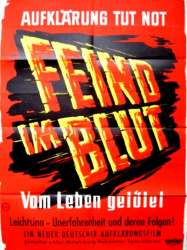
Feind im Blut (1931)
, 1h14Directed by Walter Ruttmann
Genres Drama, Documentary
Themes Medical-themed films
Actors Gerhard Bienert, Walburga Gmür, Margarete Kupfer
Rating59%





A student learns that his girlfriend has been unfaithful. He goes out in the city nightlife together with a friend. The friend spends the night with a waitress and catches syphilis.

Melody of the World (1929)
, 48minutesDirected by Walter Ruttmann
Origin German
Genres Documentary
Actors George Bernard Shaw, Grace Chiang
Rating68%





Le film n'a pas de dramaturgie au sens classique du terme. Les images se succèdent au rythme de la musique, selon des raccords inspirés par les images elles-mêmes ainsi que par les thématiques qu'elles recoupent.
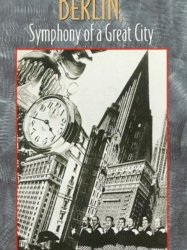 , 1h5
, 1h5Directed by Walter Ruttmann
Origin German
Genres Documentary, Historical, Animation
Themes Documentary films about cities
Rating75%





Berlin: Symphony of a Metropolis is largely an avant-garde film, and does not have a story or a plot. However, the events of the film are arranged to simulate the passage of a single day (simulated from an assemblage of film shot over the period of one year). Shots and scenes are cut together based on relationships of image, motion, point of view, and thematic content. At times, a sort of non-narrative commentary can be implied, as in edits that juxtapose workers entering a factory with cattle being beaten and driven into a corral.
Scriptwriter

Triumph of the Will (1935)
, 1h54Directed by Leni Riefenstahl
Origin German
Genres Documentary, Historical
Themes Politique, Political films
Rating70%





The film begins with a prologue, the only commentary in the film. It consists of the following text, shown sequentially, against a grey background:

Steel (1933)
, 1h7Directed by Walter Ruttmann, Mario Soldati
Origin Italie
Genres Drama
Themes Politique, Films about the labor movement, Political films
Actors Piero Pastore, Isa Pola, Olga Capri, Romano Calò, Romolo Costa, Domenico Serra
Roles Writer
Rating65%





Two steelworkers engage in a violent rivalry over a woman.

Feind im Blut (1931)
, 1h14Directed by Walter Ruttmann
Genres Drama, Documentary
Themes Medical-themed films
Actors Gerhard Bienert, Walburga Gmür, Margarete Kupfer
Roles Writer
Rating59%





A student learns that his girlfriend has been unfaithful. He goes out in the city nightlife together with a friend. The friend spends the night with a waitress and catches syphilis.

Melody of the World (1929)
, 48minutesDirected by Walter Ruttmann
Origin German
Genres Documentary
Actors George Bernard Shaw, Grace Chiang
Rating68%





Le film n'a pas de dramaturgie au sens classique du terme. Les images se succèdent au rythme de la musique, selon des raccords inspirés par les images elles-mêmes ainsi que par les thématiques qu'elles recoupent.
 , 1h5
, 1h5Directed by Walter Ruttmann
Origin German
Genres Documentary, Historical, Animation
Themes Documentary films about cities
Roles Author
Rating75%





Berlin: Symphony of a Metropolis is largely an avant-garde film, and does not have a story or a plot. However, the events of the film are arranged to simulate the passage of a single day (simulated from an assemblage of film shot over the period of one year). Shots and scenes are cut together based on relationships of image, motion, point of view, and thematic content. At times, a sort of non-narrative commentary can be implied, as in edits that juxtapose workers entering a factory with cattle being beaten and driven into a corral.
Cameraman

Metropolis (1927)
, 2h33Directed by Fritz Lang
Origin German
Genres Drama, Science fiction, Fantastic, Fantasy
Themes Films about the labor movement, Films set in the future, Political films, Dystopian films, Robot films
Actors Alfred Abel, Brigitte Helm, Gustav Fröhlich, Rudolf Klein-Rogge, Fritz Rasp, Heinrich George
Roles Director of Photography
Rating82%





In the future of 2026, wealthy industrialists rule the vast city of Metropolis from high-rise tower complexes, while a lower class of underground-dwelling workers toil constantly to operate the machines that provide its power. Joh Fredersen is the city's master. Joh's son Freder idles away his time in a pleasure garden with other rich children. Freder is interrupted by the arrival of a young woman named Maria, who has brought a group of workers' children to witness the lifestyle led by the rich. Maria and the children are quickly ushered away, but Freder is fascinated by Maria and goes to the workers' portion of the city to find her.

Die Nibelungen (1924)
, 4h48Directed by Fritz Lang
Origin German
Genres Drama, Fantastic, Fantasy, Adventure
Themes Films about animals, Films about magic and magicians, Seafaring films, Films based on mythology, Transport films, Films about dragons, Films set in the Viking Age, Films based on Norse mythology
Actors Paul Richter, Margarete Schön, Hanna Ralph, Bernhard Goetzke, Theodor Loos, Rudolf Klein-Rogge
Roles Director of Photography
Rating80%





The title character Siegfried, son of King Siegmund of Xanten, masters the art of forging a sword at the shop of Mime. Mime sends Siegfried home, but while preparing to leave, Siegfried hears the tales of the kingdom of Burgundy, the kings who rule there, as well as of Kriemhild, the princess of Burgundy. Siegfried announces he wants to win her hand in marriage, much to the amusement of the smiths. By way of physical violence, Siegfried demands to be told the way. Mime, who is envious of Siegfried's skill as a swordsmith, claims there is a shortcut through the Wood of Woden; in reality, this route will lead Siegfried away from Burgundy and expose him to attack from the magical creatures inhabiting the wood. During his journey, Siegfried discovers a dragon, and deviates from his path to slay it. He touches its hot, yellow blood and understands the language of the birds, one of which tells him to bathe in the dragon's blood in order to become invincible to attack — except for one spot on his shoulder blade, which is missed after being covered by a falling lime (linden) leaf.
Editor

Steel (1933)
, 1h7Directed by Walter Ruttmann, Mario Soldati
Origin Italie
Genres Drama
Themes Politique, Films about the labor movement, Political films
Actors Piero Pastore, Isa Pola, Olga Capri, Romano Calò, Romolo Costa, Domenico Serra
Roles Editor
Rating65%





Two steelworkers engage in a violent rivalry over a woman.

Feind im Blut (1931)
, 1h14Directed by Walter Ruttmann
Genres Drama, Documentary
Themes Medical-themed films
Actors Gerhard Bienert, Walburga Gmür, Margarete Kupfer
Roles Editor
Rating59%





A student learns that his girlfriend has been unfaithful. He goes out in the city nightlife together with a friend. The friend spends the night with a waitress and catches syphilis.

The White Stadium (1928)
, 1h26Directed by Arnold Fanck
Origin Suisse
Genres Documentary
Themes Sports films, Films about the Olympic Games, Sports d'hiver
Roles Editor
Rating72%





Après des vues idylliques de la vallée embrumée, Arnold Fanck montre l'acheminement des compétiteurs et des spectateurs par le chemin de fer rhétique et leur arrivée à Saint-Moritz. S'ensuivent des vues des sommets du massif de l'Engadine, du Piz Bernina et du Piz Palü. Après des vues sur les sommets empreints de sérénité, Fanck montre des sportifs qui skient en altitude vêtus uniquement d'un caleçon. Dans la vallée, les sportifs se préparent fébrilement (quelques séquences sont au ralenti) et présentent les nouveautés technologiques comme cette nouvelle fixation pour chaussures de ski.
 , 1h5
, 1h5Directed by Walter Ruttmann
Origin German
Genres Documentary, Historical, Animation
Themes Documentary films about cities
Roles Editor
Rating75%





Berlin: Symphony of a Metropolis is largely an avant-garde film, and does not have a story or a plot. However, the events of the film are arranged to simulate the passage of a single day (simulated from an assemblage of film shot over the period of one year). Shots and scenes are cut together based on relationships of image, motion, point of view, and thematic content. At times, a sort of non-narrative commentary can be implied, as in edits that juxtapose workers entering a factory with cattle being beaten and driven into a corral.
 Connection
Connection

